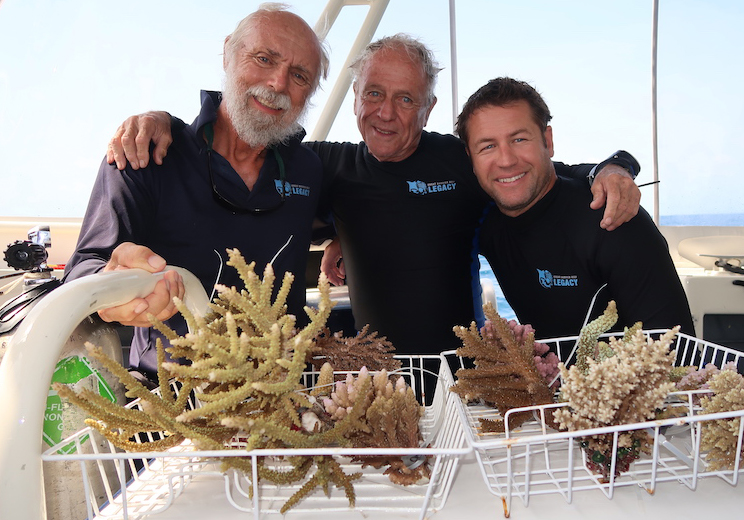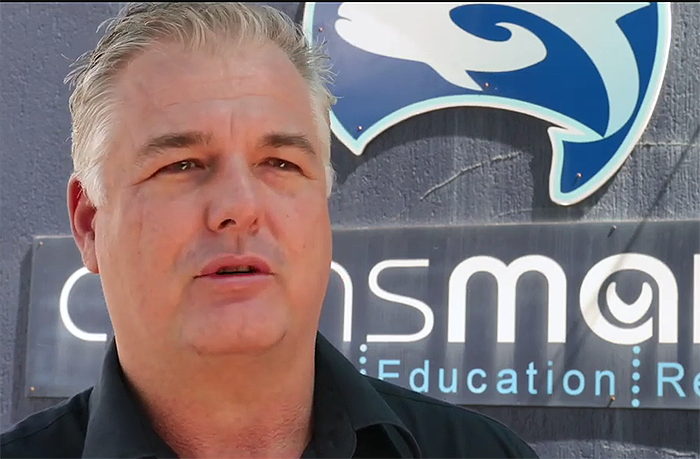
Great Barrier Reef Legacy team: John Rumney, Dr Charlie Veron, and Dr Dean Miller with collected corals for the new Living Coral Biobank.
Announced by Great Barrier Reef Legacy
The world’s first Living Coral Biobank Project is being established on the Australian coast near the waters of the threatened Great Barrier Reef.
As coral reefs worldwide decline due to climate change, severe storm events and coral disease, GBR Legacy with partners Corals of the World and Cairns Marine, will safeguard the biodiversity of all hard-coral species by collecting, storing, and keeping them alive in what they’ve dubbed a “coral ark”.
Managing Director of GBR Legacy and Project Coordinator, Dr. Dean Miller, said they plan to create a repository of hard corals from around the world in a state of the art holding facility in Port Douglas, just north of Cairns, in Queensland.
“We have just returned from the Far Northern Great Barrier Reef which has been heavily impacted by the 2016 and 2017 bleaching events as well as cyclone Trevor in 2019, all of which have affected coral diversity and ecosystem function,” he said.
“We searched for remaining biodiversity hotspots and by the end of 2020 aim to use these to collect over 200 species of corals from the Great Barrier Reef.
“This represents over half the Reef’s species, amounting to a quarter of all species worldwide,” Dr. Miller said.
The project will also use public aquariums and home aquarium collectors to hold and maintain backup fragments all over the world, creating the largest collaborative preservation network of corals. Cairns Marine, among the leaders in sustainable marinelife collection, will partner with the project to create long-term holding systems for the broodstock corals in the new bank.
Corals of the World Director and project partner, Dr. Charlie Veron, is key to the success of the project as he is one of few people worldwide that can identify corals to species level underwater.
“My entire professional career has been dedicated to collecting and identifying the world’s coral species. I’ve done this many times for science; this time I’m doing it for the coral’s very survival,” Dr. Vernon said.
“Without question, this is the most important project we can be undertaking for corals and coral reefs and the most important project I have been involved with personally.”

Lyle Squire of Cairns Marine: “We have the technology now to set up a living corals biobank and collection has already started.”
Corals are one of the few groups of organisms on earth that can be kept alive indefinitely because most form colonies that keep growing for thousands of years.
“The Living Coral Biobank Project is the perfect solution for maintaining the genetic diversity of both corals and their symbionts. That is what makes this project so critically important and unique,” he said.
Chairman and Founder of GBR Legacy, John Rumney said current approaches to securing the biodiversity of corals are not working.
“With each coral bleaching event, we are losing the most vulnerable coral species and reefs around the world. We may not have all the answers about how to save coral reefs, but this project is an extremely cost-effective and achievable undertaking that allows us to at least start to secure a better future for their survival,” he said.
“This project will ensure that we can keep corals alive until conditions in their natural environment improves, and partnering with Dr. Veron’s Corals of the World and Cairns Marine will allow us to rebuild coral communities with a high degree of certainty.
“It’s a very exciting project. It’s guaranteeing the survival of all this biodiverse coral, so we have something to work with in the future,” Mr. Rumney said.
Dr. Miller urged everyone to get involved to collaborate and help fund this project.
“The future of the Great Barrier Reef and the world’s corals is at stake. We must act now as over 25% of ocean life, and billions of people each and every day, depend on coral reefs for their very survival,” Dr. Miller said.
Donate
Great Barrier Reef Legacy: World’s First Living Coral Bank
Learn More
Keeping Arked Stony Corals in Home Aquariums: Radio Interview





This coral repository is long overdue. Thank you for spearheading. A few questions:
1) how is it being funded? A global coral tax should be imposed on every purchase and sale of coral, even captive propagated frags. It could be a nominal fee of 0.25$. This would add up! 100% of profits redistributed to coral protection and recovery efforts.
2) will these collections be a source of species for reef recovery if they are catalogued and kept separate based on point of origin? Or is this just acting as a living museum of sorts?
3) while this is necessary, more pressure is needed to establish marine protected areas that encompass coral reefs. See the Atoll islands and Palau as beacons of successful reef conservation.
We have created gene bank nurseries in our Fiji, Kiribati, and Samoa sites, focused on bleaching resistant corals. We collect corals from known stressed hot-pocket reef areas and bring the samples to cooler water nurseries. We aim to collect ten genotypes of each of the Acropora corals as they are the most vulnerable to extinction in the coming decades. Each coral is trimmed annually in the nurseries to prevent spawning and to maximize growth, with the fragments out-planted to create bleaching resistant patches on the reef, where the corals also become effective spawning aggregations and help reefs recover after bleaching. https://www.globalgiving.org/projects/emergency-response-to-massive-coral-bleaching/